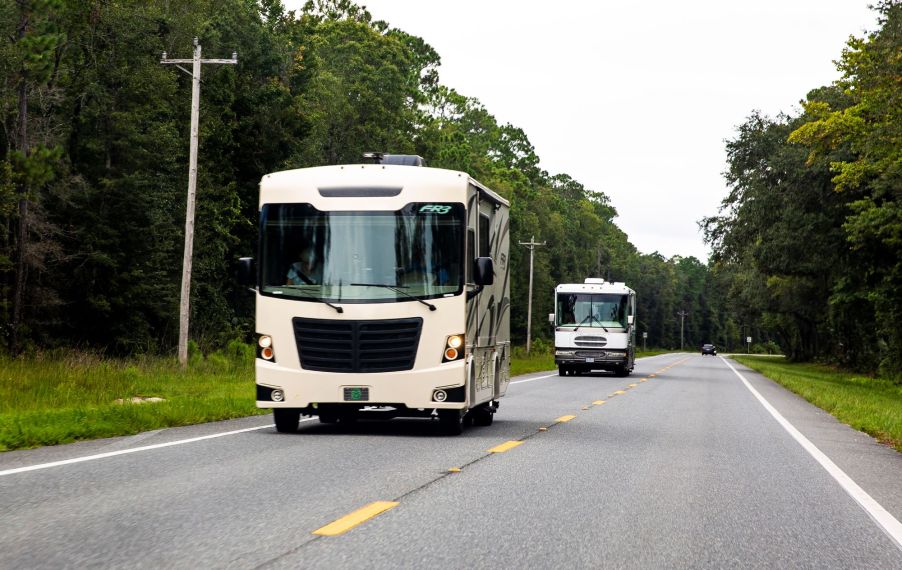
10 RV Tips Every Beginner Should Know
Whether you are camping for the weekend, taking a summer road trip, or living full-time on the road, traveling in an RV can be the adventure of a lifetime. However, there are a lot of things you need to know before heading out on the road. We’ve put together 10 RV tips to help beginners stay safe and comfortable before pulling into a campground.
Which RV lifestyle suits you?
If you are new to the lifestyle, there is a lot to learn, and the choices can seem overwhelming. Do you want to purchase a luxurious Class A diesel pusher that can cost more than a small house, or do you prefer to have a small tow-behind trailer?
Fifth-wheel RVs for glamping offer lots of space and plenty of residential features. You could go with a truck camper, van, Class C motorhome, or vintage trailer. You can even convert an old school bus into a home on wheels. The possibilities are endless.
But, before you decide what style RV you want to go with, there are several things first-time RVers must know before hitting the road. We’ve put together 10 RV Tips to help beginners stay safe and comfortable before pulling into a campground.
1. Only bring the necessities

Go through the aisles of a camping store and look for space-saving items that are practical and necessary. Since space is at a premium, purchase things like collapsible bowls and stackable pots and pans for your kitchen.
Pack your favorite linens, towels, throw pillows, and blankets to help you feel comfortable and at home in your living space. Just don’t overdo it. Bring only the toiletries you commonly use and don’t forget to purchase some RV-safe toilet paper. Stock up on your favorite foods but don’t go overboard. There is a grocery store in every corner of the country, so only bring supplies for a few days.
Ensure water and propane tanks are filled before hitting the road, and if you are in a motorhome, fill up the gas tank before venturing out on your first trip.
2. Learn how to hitch and unhitch your camper
Practice hitching and unhitching the camper before leaving your driveway to work out any bugs and become more familiar with your towing system. It will become quicker and easier each time you go through the process.
3. Take a trial run is an essential RV tip
If you don’t have experience towing a trailer or driving a motorhome, we recommend traveling short distances from home before venturing out on a lengthy road trip. Familiarize yourself with how the RV handles, check potential blind spots and get used to the turning radius. Don’t forget to practice backing up your rig, as this will be a necessary skill at most campgrounds.
4. Get all the proper connections for your RV
Check with your local RV dealer to ensure you have all the necessary supplies. You don’t want to show up at a campground and be unable to hook up power or water. The basic must-have items include a power cord adapter, sewer hoses and connections, a surge protector, wheel chocks, and a freshwater hose.
5. Learning how everything works is an excellent RV tip
Play with all the buttons and switches to learn how everything works in your camper. Practice operating the slides, awnings, and stairs, and if you identify any problems, schedule an appointment with an RV service dealer to correct any issues before leaving home.
6. Secure loose items
Put away any loose items that could move around in transit. Remember, you will be driving on the road, and anything left on a counter or tabletop will be on the floor when you arrive. Find ways to secure everything to prevent unnecessary mishaps.
7. Knowing the height, length, and weight of your camper is an important RV tip
Knowing the height will come in handy when approaching an overpass, bridge, or tunnel. To ensure you book the proper size campsite, you will need to know the length of the RV.
After loading everything into the RV and the tanks are full, visit a truck weighing station to ensure you are not exceeding the weight limit restrictions of your unit. Being overweight can cause dangerous tire blowouts and damage the RV. If you are overweight, start unloading items. You don’t have to do this every trip, but it’s essential before heading out for the first time.
8. Choose a location near a camping supply store for your first trip out
While most campgrounds have small RV stores, they do not stock a large inventory. Consider picking a location near a camping supply store so you can grab anything you forget without too much inconvenience or hassle.
9. Plan your route is a great RV tip
A GPS will provide you with directions, but unless you have an RV-specific unit, it will not show you overpasses and roads that are unsuitable for trailers. Doing some research in advance will help you choose the safest and most enjoyable route.
10. Understand the limitations of your tow vehicle
If you plan to tow a trailer, be sure you understand your tow vehicle’s limitations and towing capacity. Learn how to use the brake controller and connect the taillights. Read the operator’s manual to learn about tow mode and how it operates.
Stay safe and be ready for anything
Being prepared and learning how everything works before hitting the road will make the difference between being stressed out or having a good time. As with most things, there is a learning curve.
Glamper Life suggests, “If you are setting up your camper and can’t figure out a certain setting, etc., try asking a neighbor!” Most people in campgrounds “are only too happy to help.”
Being educated will keep you and your family safe while traveling, giving you the confidence to handle your RV for years to come.


